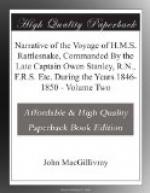September 26.
We travelled a good stage this morning before we found water—in a sandy creek, where the country seemed to fall slightly to the north-east. We still hoped to find a river running into Princess Charlotte’s Bay.
September 27.
We proceeded North-East over alternating sandy ridges and marshy flats; the latter, though dry where we passed over them, presented the appearance of being generally inundated. We camped by the side of a rocky creek, containing very little water.
September 28.
Just as we were about to start this morning, two natives, carrying a bundle of reeds and a basket, passed within a short distance of our camp, and seemed to take no notice of us. Our sheep were not to be found, having rambled to a distance: although without a sheepfold, this was the first instance in which the sheep had strayed; they generally remained by the fire, towards which they were driven at night, till morning.
We had never seen a wild native dog during the journey. Our dog that we had left behind came into the camp to-night, very much exhausted, having travelled about thirty miles; he must have subsisted on nondas, as it was impossible he could have caught anything, and we had seen him eat them before. He died the following morning.
September 30.
After travelling a short distance we crossed a small river running eastward: for some distance down it, the water was brackish, and at spring-tide the salt water came up to our camp; but we obtained good water from a small lagoon near the camp. We proceeded over a large plain well covered with good grass, the soil stiff clay. We proceeded about five or six miles on this plain, turning westward towards a lagoon surrounded by Stravadiums and a few very large palms. We hoped to find water in it, but it was dry, and fearing we should not be able to reach water before dark if we proceeded in this direction, we thought it better to return to our camp.
October 1.
We had prayers this day as usual on Sundays, at eleven o’clock. We saw native fires at a distance to the north-east of our camp, but the natives did not come near us. I went up what we fancied was the river by which we had camped, but found it only a creek; but it had plenty of water in it at this season. There were several small lagoons near it. There were large drooping tea-trees (Melaleucas) growing on its banks, and large palm trees, of the same kind as those I had seen in the plain the day




